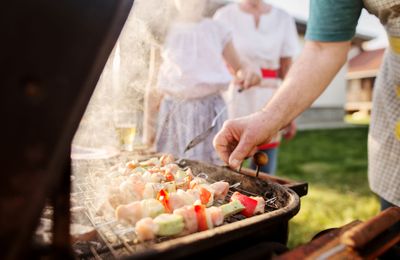By clicking a retailer link you consent to third-party cookies that track your onward journey. This enables W? to receive an affiliate commission if you make a purchase, which supports our mission to be the UK's consumer champion.
Ten expert cooking tips to create authentic Chinese cuisine at home

Forget ordering a bog-standard takeaway, we've been gathering tips and secrets from top chefs and cookery experts so you can recreate your favourite takeaways at home.
Last time round, Which? shared expert advice for creating Indian cuisine at home. Next up is Chinese cuisine.
From steak and wine to ice cream and digestives, go to the best food and drink to find out which products topped our taste tests.
1. Prepare your ingredients before cooking

Chef, author and broadcaster Ken Hom OBE recommends making sure all your ingredients are prepared and ready to go before you start cooking.
TV chef and cookery book author Ching He Huang says: 'Once you start wokking, your full and undivided attention should be in the wok - you won't have time to stop and chop (by the time you do, the ingredients will be burnt to a crisp).'
2. Marinate meat

Ken says: 'If you're using meat, then marinate it in light soy sauce, Shaoxing rice wine, sesame oil and cornflour.'
According to Belle Case, who runs Chinese cookery classes, the meat needs to marinate for at least 15 to 20 minutes before cooking to give time for the meat to soften.
3. Soak rice noodles to stop them sticking

'I've found that many people who attend my classes tend to have experienced problems cooking dried rice stick noodles,' explains Belle.
'What you need to do is to soak the noodles in lukewarm water for 30 to 60 minutes before you stir-fry them. This way the noodles won't become too sticky when you cook them.
'You also need enough oil to prevent them from sticking together too much.'
4. Add sugar to enhance flavour

Lillian Luk, founder and chef at Shanghai Supper Club, explains: 'When I use soy sauce in my seasoning, I like to add a bit of sugar to enhance its umami taste.
'Soy sauce is a fermented product, so it has a naturally acidic taste. The addition of sugar neutralises that sour aftertaste and allows its full umami flavour to come to the fore.
'The trick is to add just a little, say 1:8 ratio of sugar to soy sauce, unless you want a sweet profile to your dish.'
5. Keep cornflour to hand

According to Ching, cornflour is one of the most important ingredients in Chinese cuisine.
'It combines all the ingredients together making sure the flavours coat all the ingredients.
'Without it, we can't create glossy sauces and keep the juices in meat or fish when the ingredients cook on high heat.'
Discover which wines pair best with Chinese food in our guide to matching food and wine
6. Parboil vegetables

Belle suggests parboiling vegetables before stir-frying them. Then:
'When you're going to cook stir-fried mixed vegetables, such as baby corn, broccoli, carrot, cauliflower and mangetout, first parboil the vegetables in boiling water with a pinch of salt for a minute, drain them and then add very cold water.
'Leave them to cool down for a few minutes before stir-frying them. The vegetables will cook much more quickly and they will keep their fresh colours.
'It's important to cook them quickly - they always taste better when they are still crunchy.'
7. Don't cook with sesame oil

Helen Tse MBE, author and restaurateur, recommends using sesame oil like you would truffle oil - to taste, not to cook with.
Sesame oil has a much lower smoke point than vegetable and sunflower oil, so can burn easily.
Ching advises cooking with a stable odourless oil such as peanut, vegetable, sunflower or rapeseed oil.
8. Use Shaoxing rice wine or dry sherry

'Shaoxing rice wine or dry sherry is magic', says Ching.
'It enhances the savoury sweetness or deep rich sweet umami in dishes, and adds a special layer of flavour.'
She recommends adding it to your favourite protein (for example chicken or tofu), before it's completely cooked through so it absorbs the flavour.
9. Don't be afraid to turn up the heat

'Master Chinese chefs will heat the wok up until it's red hot', Ching explains, 'because as you add ingredients, the temperature falls and you will lose your sear and sizzle'.
Mike Mounfield, operations director at Lu Ban restaurant and member of the Tianjin Chefs association, says: 'To check if your fat or oil is hot enough, sprinkle a small amount of flour in the wok. If it fizzes that's a sign the pan is ready to cook in'.
10. Add water to vegetables in the wok

Ching advises adding a small drop of water around the edge of the wok when you're stir-frying vegetables.
That way you can steam the vegetables while still searing on a high heat for perfectly cooked vegetables.
Planning a barbecue this Bank Holiday? Make sure to check out our chefs' secrets for cooking up the best barbecue food



